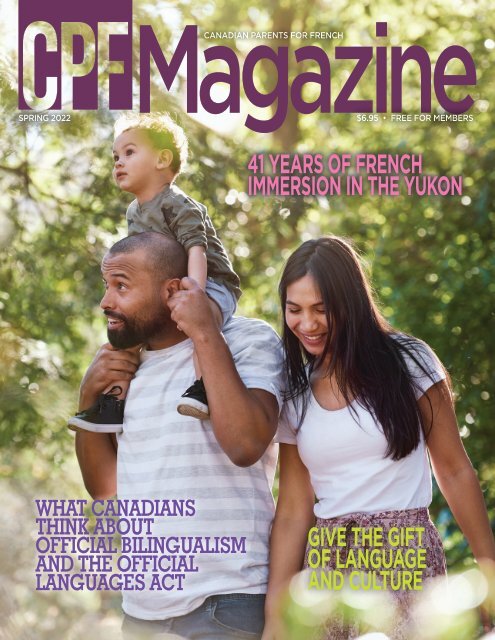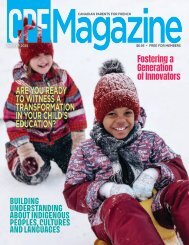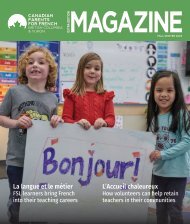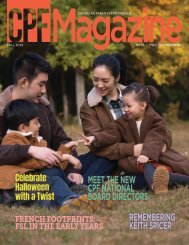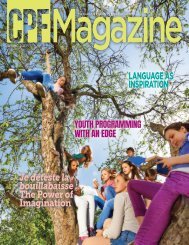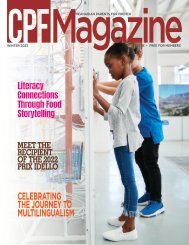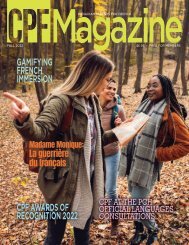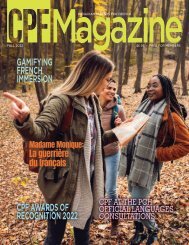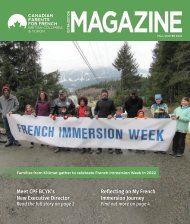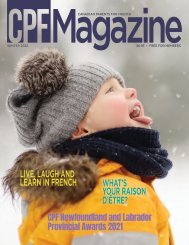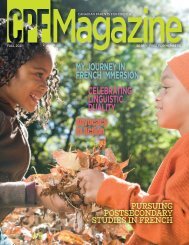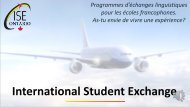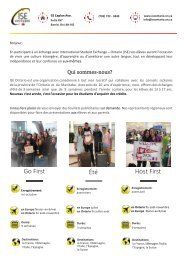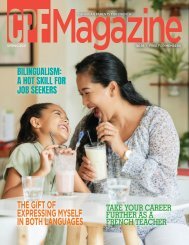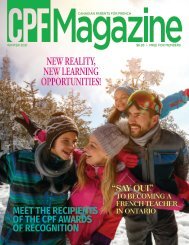CPF Magazine Spring 2022 Issue
A national network of volunteers, parents and stakeholders who value French as an integral part of Canada. CPF Magazine is dedicated to the promotion and creation of French-second-language learning opportunities for young Canadians.
A national network of volunteers, parents and stakeholders who value French as an integral part of Canada. CPF Magazine is dedicated to the promotion and creation of French-second-language learning opportunities for young Canadians.
You also want an ePaper? Increase the reach of your titles
YUMPU automatically turns print PDFs into web optimized ePapers that Google loves.
SPRING <strong>2022</strong><br />
<strong>Magazine</strong><br />
$6.95 • FREE FOR MEMBERS<br />
CANADIAN PARENTS FOR FRENCH<br />
41 YEARS OF FRENCH<br />
IMMERSION IN THE YUKON<br />
WHAT CANADIANS<br />
THINK ABOUT<br />
OFFICIAL BILINGUALISM<br />
AND THE OFFICIAL<br />
LANGUAGES ACT<br />
GIVE THE GIFT<br />
OF LANGUAGE<br />
AND CULTURE
is pursuing a<br />
career where I can<br />
share different<br />
cultures.<br />
AHMAD RAHAL<br />
Future Teacher<br />
Fulfill your raison d’être.<br />
TeachInFrench.ca
<strong>Magazine</strong><br />
CANADIAN PARENTS FOR FRENCH<br />
SPRING <strong>2022</strong><br />
www.cpf.ca<br />
CONTRIBUTORS<br />
Raymond Théberge, Michael Salvatori,<br />
Janet Steinthorson and other authors and<br />
organizations, as noted in their articles.<br />
EDITORIAL MANAGER<br />
Marcos Salaiza<br />
GRAPHIC DESIGN<br />
Stripe Graphics Ltd.<br />
PRINTING<br />
Trico Evolution<br />
SUBMISSIONS<br />
Canadian Parents for French<br />
1104 - 170 Laurier Ave. W.<br />
Ottawa, ON K1P 5V5<br />
(613) 235-1481, www.cpf.ca<br />
Advertising: Cathy Stone<br />
Canadian Parents for French<br />
Email: advertise@cpf.ca<br />
<strong>CPF</strong> <strong>Magazine</strong> is published three times per<br />
year for members of Canadian Parents for<br />
French. Our readership includes parents<br />
of students learning French as a second<br />
language, French language teachers,<br />
school board or district staff, and provincial,<br />
territorial and federal government staff<br />
responsible for official languages education.<br />
CHANGE OF ADDRESS<br />
To signal a change of address,<br />
contact Canadian Parents for French<br />
at (613) 235-1481, or email:<br />
cpf.magazine@cpf.ca<br />
Editorial material contained in this<br />
publication may not be reproduced<br />
without permission.<br />
Publications Mail Agreement No. 40063218<br />
Return undeliverable mail to Canadian<br />
Parents for French at the address above.<br />
To become an online subscriber, email<br />
cpf.magazine@cpf.ca. For an online version<br />
of this issue, visit www.cpf.ca.<br />
SPRING <strong>2022</strong><br />
Table of Contents<br />
FEATURES<br />
2 Bon vent! Glyn Lewis Departs <strong>CPF</strong> BC & YT<br />
3 Bilingualism: A Gift From My Father<br />
8 Commissioner’s Letter:<br />
Two Years into the Pandemic, Canadians’ Support<br />
for Core Values of Official Bilingualism and Diversity<br />
Remains High<br />
16 Meet the Parents… Where They Are:<br />
Culturally Responsive Approaches to Family Engagement<br />
REGULAR ARTICLES<br />
2 PRESIDENT’S MESSAGE<br />
6 <strong>CPF</strong> BRANCHES:<br />
FSL TEACHER RECRUITMENT & RETENTION<br />
Teach in French:<br />
Give the Gift of Language and Culture<br />
12 <strong>CPF</strong> RESOURCES<br />
Dyslexia in French Immersion:<br />
Believe It or Not, It is Still Okay<br />
14 <strong>CPF</strong> PARTNERS<br />
Meet Chantal Ross Recipient of the 2021 Prix IDÉLLO<br />
18 <strong>CPF</strong> FSL PROGRAMS<br />
Celebrating 41 Years of French Immersion in the Yukon!<br />
20 KEY <strong>CPF</strong> CONTACTS ACROSS CANADA<br />
21 <strong>CPF</strong> ADVOCACY WORKSHEET<br />
Building Linguistic Security. Be Brave, Speak French!<br />
Canadian Parents for French is a nationwide, research-informed, volunteer organization<br />
that promotes and creates opportunities to learn and use French for all those who<br />
call Canada home.
PRESIDENT’S MESSAGE<br />
Bonjour! Time flies, we are almost halfway<br />
through <strong>2022</strong>! <strong>Spring</strong> is a time for renewal, when<br />
nature reminds us of new beginnings and that is<br />
time to make the most out of the warmer and<br />
longer days ahead. It is with this idea in mind that<br />
we have put together this issue of <strong>CPF</strong> <strong>Magazine</strong><br />
for you to enjoy.<br />
As we head towards the end of the school<br />
year, we have included some updates on projects<br />
as well as research-based articles to reflect on<br />
what has been, undoubtedly, another challenging<br />
year. So far in <strong>2022</strong>, we also have very good<br />
news, a new public opinion survey published in<br />
February shows that 87% of Canadians support bilingualism<br />
and the Official Languages Act; the survey was released by the<br />
Office of the Commissioner of Official Languages. You will find<br />
more information about this survey in an article written by the<br />
Commissioner, Raymond Théberge, and in the infographic<br />
that goes with it.<br />
At the National Board and throughout the Network we are<br />
having a busy spring focused on advocacy and other key issues.<br />
Across the Network, several advocacy events<br />
took place in April; we published a new<br />
advocacy-oriented research brief “Learning<br />
French in the Early Years. For a Bright Bilingual<br />
Future!” Finally, we are gearing up for the <strong>CPF</strong><br />
Leader Networking Event taking place in the<br />
summer and we are also looking forward to<br />
your participation this fall at the <strong>CPF</strong> Network<br />
Virtual Conference. Stay tuned as details<br />
about the conference and other opportunities<br />
become available.<br />
As always, I would like to thank all our<br />
volunteers, members and parents for their<br />
commitment to French as a second language education and<br />
the work we do.<br />
We hope you enjoy this issue, stay safe! À la prochaine! n<br />
DERREK BENTLEY<br />
<strong>CPF</strong> NATIONAL PRESIDENT<br />
Bon vent! Glyn Lewis<br />
Departs <strong>CPF</strong> BC & YT<br />
In March we said goodbye to<br />
Glyn Lewis, who served as the<br />
<strong>CPF</strong> British Columbia & Yukon<br />
Branch Executive Director for more<br />
than 14 years. He demonstrated<br />
a strong commitment to the<br />
organization's mandate.<br />
The <strong>CPF</strong> Network greatly<br />
benefited from his strengths in<br />
advocacy, media relations and<br />
outreach. We wish him the best<br />
of luck in his future endeavours.<br />
Merci Glyn!<br />
Glyn Lewis at the 2019 <strong>CPF</strong> FSL Awareness Breakfast in Ottawa.<br />
2 <strong>CPF</strong> MAGAZINE SPRING <strong>2022</strong>
Bilingualism:<br />
A Gift From My Father<br />
BY MICHAEL VANDERGRIFT, DEPUTY MINISTER OF INTERGOVERNMENTAL AFFAIRS, PRIVY COUNCIL OFFICE<br />
<strong>CPF</strong> MAGAZINE SPRING <strong>2022</strong> 3
THIS ARTICLE WAS FIRST PUBLISHED ON SEPTEMBER 03, 2021 IN THE LANGUAGE PORTAL OF CANADA’S OUR LANGUAGES<br />
BLOG. A TRANSLATION BUREAU INITIATIVE, THE LANGUAGE PORTAL PROVIDES CANADIANS WITH A WIDE RANGE OF<br />
RESOURCES TO HELP THEM COMMUNICATE MORE EFFECTIVELY IN ENGLISH AND FRENCH, AND PUBLISHES WEEKLY<br />
ARTICLES BY LANGUAGE LOVERS ON THE OUR LANGUAGES BLOG.<br />
> https://www.noslangues-ourlanguages.gc.ca/en/blogue-blog/bilinguisme-un-legs-bilingualism-a-gift-eng<br />
When Lucie Séguin, Chief<br />
Executive Officer of the<br />
Translation Bureau, gave me<br />
the opportunity to write this post for the<br />
Our Languages Blog, I knew I would want<br />
to reflect on how bilingualism and French<br />
as a second language have played a<br />
special role in my life, even though my<br />
own skills and confidence have varied<br />
over the years.<br />
I grew up in Edmonton, Alberta,<br />
and studied French as a subject in school,<br />
as many other students did. However,<br />
there was one small difference between<br />
the other students and me: my father<br />
was the high school French teacher. I<br />
remember that it was occasionally<br />
awkward to be in his class. However, I<br />
now value the memory of seeing his love<br />
of language and teaching in action. As for<br />
my relationships with my classmates, all<br />
I can say is that it was a good thing I was<br />
captain of the basketball team!<br />
When I was in Grade 11, my father/<br />
teacher organized an exchange for our<br />
class with a school in St-Georges de<br />
Beauce. I believe he applied to a federal<br />
program in place at that time to support<br />
these exchanges. The family of my<br />
Québécois counterpart generously hosted<br />
me for a week, and this visit left a lasting<br />
impression. Not only did I taste poutine<br />
for the first time, I also experienced what<br />
French was like when you actually live it,<br />
not just read it in the pages of a textbook.<br />
Later, the richness of this experience<br />
motivated me to spend time immersed in<br />
the French language in Jonquière and in<br />
Trois-Rivières during my university years.<br />
I resolve to not let the pendulum<br />
swing back but instead do more<br />
and push myself out of my comfort<br />
zone in my second language.<br />
4 <strong>CPF</strong> MAGAZINE SPRING <strong>2022</strong>
I credit those experiences of lived<br />
French with helping me to acquire the<br />
language and appreciate its complexity.<br />
It was also humbling to experience the<br />
challenges of living in a second language.<br />
Clearly, it was only by consistently using<br />
the language that I could truly improve.<br />
However, these episodes are on one<br />
end of the pendulum marking my level of<br />
ease in my second language throughout<br />
my life. It often swung back the other way.<br />
As is true for many people, these learning<br />
experiences weren’t always followed up<br />
with continued practice and use, and<br />
I have only myself to blame for allowing<br />
my skills to become rusty at times and<br />
my confidence to wane.<br />
But thankfully the pendulum<br />
hasn’t stayed there. I’m drawing on the<br />
foundations of my past experience to use<br />
my second language more naturally and<br />
regularly at work. And I’m happy<br />
that there are language resources,<br />
such as those of the Language Portal<br />
of Canada, available to help me to<br />
continually improve. I’m grateful<br />
to those whom I work with every<br />
day for their patience.<br />
These efforts have paid off<br />
throughout the pandemic with the<br />
many opportunities I’ve had to engage<br />
with colleagues at Public Services and<br />
Procurement Canada in town halls,<br />
team meetings and other events in<br />
both official languages. Communication<br />
was and is vitally important. I’ll<br />
take with me those positive experiences,<br />
and I resolve to not let the pendulum<br />
swing back but instead do more and<br />
push myself out of my comfort zone in<br />
my second language, as francophone<br />
colleagues so often do. I also know<br />
I can do more to create a space for<br />
others to work in both official<br />
languages.<br />
How have you created a space for<br />
people to use both official languages at<br />
work? What do you do to maintain and<br />
improve your skills?<br />
Now, back to my father who<br />
started it all. He took a mid-career risk<br />
to follow his passion and obtained a<br />
doctorate in second language education,<br />
with a focus on listening acquisition.<br />
He later taught future educators at the<br />
University of Ottawa and had an active<br />
research program that reached teachers<br />
all over the world. He passed away all too<br />
soon five years ago, and as I reflect while<br />
writing this piece, I wish I could thank<br />
him for giving me those formative<br />
experiences and an appreciation for<br />
bilingualism in Canada. n<br />
Violence sexuelle – counselling individuel ou en<br />
groupe<br />
Femmes et jeunes<br />
Le Women’s Support Network propose des services gratuits,<br />
anonymes et confidentiels pour les victimes de violence sexuelle<br />
ou les personnes qui y sont sujettes…<br />
Agression sexuelle<br />
Viol par une connaissance<br />
Violence sexuelle dans l’enfance<br />
Harcèlement sexuel<br />
Cyberviolence sexuelle<br />
Pour prendre rendez-vous, composez le 905 895-3646, poste<br />
111<br />
Ligne d’écoute téléphonique 24 heures sur 24,<br />
sept jours sur sept : 1 800 263-6734<br />
info@womenssupportnetwork.ca<br />
<strong>CPF</strong> MAGAZINE SPRING <strong>2022</strong> 5
<strong>CPF</strong> BRANCHES FSL TEACHER RECRUITMENT & RETENTION<br />
6 <strong>CPF</strong> MAGAZINE SPRING <strong>2022</strong>
<strong>CPF</strong> BRANCHES FSL TEACHER RECRUITMENT & RETENTION<br />
TEACH IN FRENCH<br />
Give the Gift of<br />
Language and Culture<br />
BY JANET STEINTHORSON EXECUTIVE DIRECTOR, CANADIAN PARENTS FOR FRENCH MANITOBA<br />
I<br />
n an effort to encourage the<br />
recruitment and retention of<br />
teachers of French, Canadian Parents<br />
for French - Manitoba (<strong>CPF</strong> MB) facilitates<br />
the initiative “Teach in French – Give the<br />
Gift of Language and Culture”.<br />
The initiative includes public<br />
promotional campaigns and informative<br />
and interactive presentations that are<br />
available for a variety of target groups<br />
and range for audiences from grade 5<br />
to undergraduate students.<br />
The Teach in French presentations<br />
are available in French, English, or bilingual<br />
and inform audiences that teaching in<br />
French (French immersion program)<br />
and teaching French (English program)<br />
are viable, worthwhile, personally<br />
enriching, and rewarding career options.<br />
The presentations also provide parents,<br />
teachers, guidance counselors, and<br />
post-secondary educators with knowledge<br />
about French language teaching as a<br />
career option so that they are better<br />
informed as mentors to give guidance/<br />
direction to their children/students.<br />
Teach in French – Give the Gift of<br />
Language and Culture raises awareness<br />
about the rewarding careers of teaching<br />
in French or teaching French courses<br />
and focuses on the lifelong benefits<br />
while encouraging and supporting<br />
students in Manitoba to explore careers<br />
in French language teaching. Together<br />
with its partners, <strong>CPF</strong> MB promotes the<br />
importance of recruiting and retaining<br />
qualified FSL teachers, to ensure that<br />
quality FSL programs are available to<br />
youth in Manitoba. n<br />
To learn more, visit:<br />
https://mb.cpf.ca/en/<br />
cpf-projects/teach-in-frenchgive-the-gift-of-language<br />
-and-culture<br />
<strong>CPF</strong> MAGAZINE SPRING <strong>2022</strong> 7
COMMISSIONER’S LETTER:<br />
Two Years into the Pandemic,<br />
Canadians’ Support for<br />
Core Values of Official<br />
Bilingualism and Diversity<br />
Remains High<br />
Good news hasn’t exactly been easy to come by lately,<br />
but we could all use some, and I’ve got some good news<br />
that I’d like to share. According to a recently published<br />
telephone survey conducted by Environics and the Office of<br />
the Commissioner of Official Languages, an impressive 87%<br />
of Canadians support the aims of the Official Languages Act,<br />
which promotes the equality of English and French and ensures<br />
federal services in the two languages. A number that speaks<br />
volumes.<br />
What’s more is that this level of support is virtually<br />
unchanged from a similar survey conducted for our office<br />
in 2016.<br />
Why is this such a big deal?<br />
For starters, the federal government recently tabled a<br />
new official languages bill, so these results are timely.<br />
But more broadly, the results are important because<br />
of what they tell us about ourselves and the resiliency of<br />
our shared values under trying circumstances.<br />
In the last half decade, we have experienced a creeping<br />
populist majoritarian discourse south of the border and<br />
around the world, two federal elections resulting in two<br />
hung parliaments, a proliferation of knee-jerk responses and<br />
disinformation on social media that has undermined trust in<br />
academia, in journalism, in science and in government, and<br />
a once-in-a-century global pandemic that has stretched the<br />
patience and tolerance of us all. In spite of everything, an<br />
8 <strong>CPF</strong> MAGAZINE SPRING <strong>2022</strong>
overwhelming majority of Canadians continues to support<br />
official bilingualism, one of the core principles that lie at the<br />
heart of Canadian diversity, inclusiveness and human rights.<br />
That is why this is such a big deal.<br />
The national consensus in favour of official bilingualism has<br />
held, and the naysayers, although loud and never shy about<br />
sharing their negative views, clearly do not speak for any one<br />
particular group or region. Indeed, support for the Official<br />
Languages Act was high across the board, including<br />
• in Western Canada (82%), Ontario (87%), Quebec (95%) and<br />
Atlantic Canada (86%)<br />
• among English (85%), French (96%) and other (87%) mother<br />
tongue populations<br />
• among younger (90%) and older (84%) adults<br />
• among racialized groups (87%)<br />
• among people born in (88%) and outside of (86%) Canada<br />
In addition to supporting the Act, Canadians are in<br />
general agreement with other specific measures in support<br />
of official bilingualism and official language minorities, for<br />
example, minority language education and better access to<br />
second-language education.<br />
The survey also found that support for official bilingualism<br />
is consistent with support for other forms of diversity. Too often<br />
we read commentary that reduces diversity to a “zero-sum<br />
game,” weighing different minorities against each other – not<br />
for the purposes of expanding language rights, but rather to roll<br />
them back. This is why I was encouraged to see that Canadians<br />
agree that official bilingualism and other forms of diversity can<br />
work well together. For instance, most agree that having two<br />
official languages, instead of just one, “sends the signal that<br />
Canada values linguistic diversity” (86%), and that it “has made<br />
Canada a more welcoming place for immigrants from different<br />
cultures” (79%).<br />
Perhaps most encouragingly in the context of reconciliation,<br />
78% agree that Canada can and should promote both official<br />
languages and Indigenous languages at the same time.<br />
All this being said, we must never take public support for<br />
our core values for granted. Governments at all levels and<br />
in all regions must work hard to advance official languages<br />
and minority language rights, policies and programs and<br />
help promote them among Canadians. In the Prairies, where<br />
people are more likely to feel disconnected from the federal<br />
government, support for the Act remains high (79%) but below<br />
the national average. The survey also shows that in Quebec,<br />
people continue to have far greater exposure to the two<br />
languages than elsewhere, which may help to explain some<br />
of the mounting anxieties about the future of French. Across<br />
Canada, problematic myths persist. An online component of<br />
the survey revealed that: many still think all federal employees<br />
must be bilingual (not true, only 42% of positions in the core<br />
administration are designated bilingual); most Anglophones<br />
and most Francophones think that outside Quebec French is no<br />
longer the second-most common language (it still is, and by far);<br />
and nearly half of Francophones think that the English-speaking<br />
minority in Quebec is more socio-economically privileged than<br />
the Francophone majority (which is not the case).<br />
But if the glass is 13% empty, let’s not forget that it’s also<br />
87% full. Too often, we amplify the negative voices in our<br />
public discourse. It’s time to acknowledge the quiet majority of<br />
Canadians.<br />
Support for cultural-linguistic minority rights does<br />
not always fare well in times of crisis, want and hardship.<br />
Remarkably, however, support for official languages today is just<br />
about as strong as it was in “the beforetimes,” in the halcyon<br />
pre-pandemic days of 2016. Much has changed since then, and<br />
not a great deal of it for the better. In spite of it all, when it<br />
comes to the fundamental value of official bilingualism, we have<br />
remained true to ourselves. We may have lost our innocence,<br />
but in this respect, at least, we have hung on to our humanity. n<br />
Raymond Théberge, Commissioner of<br />
Official Languages of Canada<br />
Raymond Théberge is the Commissioner of<br />
Official Languages of Canada, an independent<br />
Agent of Parliament.<br />
The survey by Environics Research and the Office of<br />
the Commissioner of Official Languages was carried out<br />
in September and October 2021 and included a national<br />
telephone probability survey of 1,507 adult Canadians<br />
(margin of error +/- 2.5%, 19 times out of 20) and a<br />
national online panel survey of 1,500 adult Canadians.<br />
Specific figures mentioned in this article refer to the<br />
telephone results unless otherwise indicated.<br />
In English:<br />
https://twitter.com/OCOLCanada<br />
En français :<br />
https://twitter.com/CLOduCanada<br />
In English:<br />
https://www.facebook.com/officiallanguages<br />
En français :<br />
https://www.facebook.com/languesofficielles<br />
continued >><br />
<strong>CPF</strong> MAGAZINE SPRING <strong>2022</strong> 9
WHAT CANADIANS<br />
THINK<br />
about official bilingualism and<br />
the Official Languages Act<br />
SUPPORT FOR THE OFFICIAL LANGUAGES ACT<br />
REMAINS STRONG ACROSS CANADA<br />
87%<br />
SUPPORT<br />
(2016: 88%)<br />
87%<br />
(2016: 84%)<br />
90% 89% 84%<br />
80%<br />
(2016: 90%)<br />
78%<br />
(2016: 83%)<br />
87%<br />
(2016: 87%)<br />
95%<br />
(2016: 92%)<br />
86%<br />
(2016: 91%)<br />
of 18- to<br />
34-year-olds<br />
of 35- to<br />
54-year-olds<br />
of those 55<br />
and older<br />
support the Official Languages Act<br />
Regional changes were within<br />
the margins of error<br />
SUPPORT ACCORDING TO<br />
LANGUAGE OF RESPONDENTS<br />
Strongly support<br />
65%<br />
27%<br />
BILINGUAL<br />
48%<br />
UNILINGUAL<br />
Somewhat support<br />
35%<br />
67%<br />
28%<br />
FRENCH<br />
33%<br />
53%<br />
ENGLISH<br />
MOST COMMONLY CITED<br />
REASON FOR SUPPORT,<br />
IN ALL REGIONS:<br />
The Act recognizes<br />
Canada’s history,<br />
status and culture as<br />
a bilingual country.
34-year-olds 54-year-olds<br />
and older<br />
support the Official Languages Act<br />
Regional changes were within<br />
the margins of error<br />
SUPPORT ACCORDING TO<br />
LANGUAGE OF RESPONDENTS<br />
Strongly support<br />
65%<br />
27%<br />
BILINGUAL<br />
48%<br />
UNILINGUAL<br />
Somewhat support<br />
35%<br />
67%<br />
28%<br />
FRENCH<br />
33%<br />
53%<br />
ENGLISH<br />
MOST COMMONLY CITED<br />
REASON FOR SUPPORT,<br />
IN ALL REGIONS:<br />
The Act recognizes<br />
Canada’s history,<br />
status and culture as<br />
a bilingual country.<br />
FEDERAL<br />
SERVICES<br />
should be in English<br />
and French<br />
94%<br />
MAJOR EVENTS<br />
IN CANADA<br />
like the World Cup<br />
should take<br />
place in both<br />
official languages<br />
75%<br />
IN TIMES OF CRISIS,<br />
political leaders should<br />
speak to Canadians<br />
in their preferred<br />
official language<br />
77%<br />
CANADIANS AGREE<br />
PERSONALLY<br />
IN FAVOUR<br />
of bilingualism<br />
for all of Canada<br />
84%<br />
82%<br />
ADVANTAGES OF BILINGUALISM<br />
Percentage of respondents who agree<br />
Job opportunities<br />
THE PRIME<br />
MINISTER<br />
OF CANADA<br />
should be<br />
bilingual<br />
93%<br />
SUPREME<br />
COURT JUDGES<br />
should be<br />
bilingual<br />
77%<br />
Because English and<br />
French are part of our<br />
history, IT MAKES<br />
SENSE THAT THEY HAVE<br />
EQUAL STATUS<br />
79%<br />
Provide better service<br />
Meet Canadians who speak<br />
the other official language<br />
Travel abroad<br />
Become familiar with another culture<br />
93%<br />
89%<br />
88%<br />
87%<br />
HAVING<br />
TWO OFFICIAL<br />
LANGUAGES<br />
is one of the things<br />
that really defines<br />
Canada<br />
78%<br />
Survey conducted by Environics for the Office of the Commissioner of<br />
Official Languages in September and October 2021. The telephone<br />
survey results (sample: 1,507 respondents) have a margin of error at<br />
the national level of +/-2.5%, 19 times out of 20.<br />
OFFICIALLANGUAGES.GC.CA
<strong>CPF</strong> RESOURCES<br />
Dyslexia in French Immersion:<br />
Believe It or Not, It is Still Okay<br />
BY DR. BOBBI WEGNER CLINICAL PSYCHOLOGIST<br />
THIS ARTICLE WAS FIRST PUBLISHED ON MARCH 11, 2018 IN DR. BOBBI WEGNER’S BLOG<br />
https://www.drbobbiwegner.com/blog/2018/03/11/2018-3-11-dyslexia-in-french-immersion-believe-it-or-not-it-is-still-okay-y6hel<br />
12 <strong>CPF</strong> MAGAZINE SPRING <strong>2022</strong>
<strong>CPF</strong> RESOURCES<br />
You know how at kindergarten orientation night, they say<br />
French Immersion is good for everyone except for the kids<br />
with Language-Based Learning Disabilities? Well, my kid falls<br />
into that category in a pretty real way, although I did not know it<br />
at the time. It has not been explicitly stated but my maternal radar<br />
says he is probably a worst-case scenario for the program. Oops.<br />
Sorry Bud. Probably a first in one of many future parenting fails.<br />
Well, not quite.<br />
Mark and I sat in Cam’s third grade IEP meeting and we<br />
no longer could live in denial – Cam has serious reading issues<br />
that fall outside of ‘he is behind because he is in French’. His<br />
decoding is BAD, which means he cannot make sense of the<br />
sounds that go along with letters. Long and short of it, he can’t<br />
read on his own. And now in third grade when the program<br />
moves to 50% English, his deficit is glaringly obvious.<br />
I felt like we had done all the right things, focusing on just<br />
one language (French because he was already in it when the<br />
reading issues were suspected halfway through first grade),<br />
private weekly French tutoring for 2 years, regular reading<br />
support in class, French camps. The works. Emmanuel Macron<br />
would be pleased in my little Francophile. Unfortunately, it has<br />
been at the complete detriment of his English, and now the gap<br />
between the other kids and he has widened. Ugh.<br />
Although I spent the first weeks after the IEP meeting on<br />
every Dyslexia blog possible and thankfully went as far as to<br />
meet with Thomas Hehir, the ex-director of the U.S. Department<br />
of Education's Office of Special Education and who responsible<br />
for federal leadership in implementing the Individuals with<br />
Disabilities Education Act (IDEA). He helped me re-direct the<br />
mother ship that was quickly sinking.<br />
During our talk, it became clear to me that despite Cam’s<br />
reading challenges, there are many successes – he is well-liked<br />
by teachers and peers, he is hard working, motivated, and most<br />
importantly, he loves French. My view of success and academic<br />
goals widened. Dr. Hehir gently let me know that Cam’s reading<br />
issues are going to be lifelong and although it is crucial that<br />
we intervene aggressively, his happiness and willingness to do<br />
school is paramount. “Our prisons are filled with dyslexics”,<br />
he said, as these kids end up hating school, acting out, and<br />
unfortunately leave as soon as they can. Unfortunately, many<br />
kids do not have the support they absolutely need to flourish. He<br />
also shared some of his research from his book How Did You Get<br />
Here? Students with Disabilities and Their Journeys to Harvard;<br />
what he found was that one important factor in helping kids<br />
succeed is having a “caring mother.”<br />
I felt sad that my little boy will always struggle with<br />
reading, but my hope for Cam blossomed. Dr. Hehir helped<br />
me think about how to support Cam through tutoring and<br />
accommodations (text to speech, speech to text, Learning Ally,<br />
C Pen, Lexia, Chrome book/iPad), and the school suggested we<br />
focus on bilingualism rather than biliteracy.<br />
My job is not to close the reading gap per se but to help<br />
Cam read as best as he can while “not burning him out” and<br />
help him understand how to use tools that he will probably need<br />
forever. That I can do. My role was more clearly defined, I felt<br />
empowered, and now I can empower Cam. Despite mourning<br />
the loss of Cam being a natural reader, his picture is clearer, my<br />
maternal hunch was validated, and we have an achievable plan.<br />
I know he can have academic success despite reading struggles,<br />
and most importantly, I can help him see this in himself.<br />
So, for all you parents out there with struggling readers,<br />
who either know their kids have language-based learning issues<br />
or have a hunch they aren’t reading like their peer, don’t panic.<br />
Here are some suggestions:<br />
n Ask the school to evaluate.<br />
n Get an outside neuropsychological evaluation, if possible.<br />
They are expensive 1k-5k, and most often are not covered by<br />
insurance. You can petition the school system to help cover<br />
the cost and the neuropsychologist should be able to help<br />
you fill out the forms.<br />
n Join a group and get informed as a parent Decoding<br />
Dyslexia is a MA-based Dyslexia Group and Dyslexia Support<br />
for Parents of Dyslexic Children, both are on Facebook.<br />
International Dyslexia Association is also good.<br />
n Know that you are your child’s advocate. We have a<br />
wonderfully collaborative relationship with Cam’s IEP team<br />
which has served him in getting his needs met. The school can<br />
be both on your side and at times, in opposition. Empathize<br />
with each member of the team and their limits, and know<br />
your rights (the law).<br />
n Be realistic about your child’s needs and where to find<br />
support. Support groups help with this. Lean on people who<br />
have already gone through this<br />
n Intervene as soon as possible. We use Nicole Debassio from<br />
The Purple Cow Reads (http://www.thepurplecowreads.com)<br />
and she has helped Cam make HUGE gains. Use a program<br />
like Wilson or Orton-Gillingham.<br />
n Get informed. There is a lot of information out there. Sort<br />
through what fits your child.<br />
n Make homework time as tolerable as possible – snacks,<br />
breaks (work 15 mins, 3 min break), dare I say fun. In our<br />
house, it is when Cam gets the most 1:1 attention. We both<br />
do our “work” together. He actually does 15 minutes of<br />
homework followed by 3-5 minutes of biofeedback (which<br />
greatly helps keep him focused). It is something I am trained<br />
in as a clinical psychologist but is very useable at home. If you<br />
are interested in learning more, check out Boston Behavioral<br />
Medicine in Brookline. https://www.mayoclinic.org/testsprocedures/biofeedback/about/pac-20384664<br />
n Utilize tools. Accommodations are your friend.<br />
n Reward the work ethic and study habits (not the<br />
spelling grade).<br />
n And, don’t panic. This will all be okay with proper<br />
intervention. There is no right answer. Stay in French,<br />
or not. But build a strong collaborative network around<br />
you and your child and communicate. n<br />
<strong>CPF</strong> MAGAZINE SPRING <strong>2022</strong> 13
<strong>CPF</strong> PARTNERS<br />
MEET<br />
Chantal Ross<br />
Recipient of the<br />
2021 Prix IDÉLLO<br />
Earlier this spring, IDÉLLO and Canadian Parents for<br />
French were pleased to announce madame Chantal Ross<br />
as the 2021 Prix IDÉLLO winner in the French as<br />
a Second Language Teacher in an English School category!<br />
Madame Ross teaches French as a Second Language to students<br />
in grades 6 through 8 at Notre Dame Catholic School in Orillia,<br />
Ontario, which is part of the Simcoe Muskoka Catholic District.<br />
All of the activities madame Ross develops for her students<br />
focus on the Francophone community in Ontario. Her goals<br />
are to bring the language to life and encourage students to use<br />
their skills beyond the walls of the classroom.<br />
Since 2021, <strong>CPF</strong> has sponsored the FSL Teacher in an<br />
English School category which recognizes dedicated teachers<br />
committed to their students, working in French immersion,<br />
core French, and extended French programs. Madame Ross was<br />
granted the award due to her authentic approach to teaching,<br />
her passion for the French language as well as the respect and<br />
patience she has for her students.<br />
Students look forward to coming to her class because<br />
they know they will be practising the language in authentic<br />
situations, like celebrating Franco-Ontarian Day or walking<br />
to McDonald’s to order in French. In the classroom, every<br />
activity is set in a Francophone context and engages the<br />
students, whether it’s reading a text or watching videos. She<br />
also demonstrates how to incorporate French in everyday<br />
situations by speaking French in everything she does at school,<br />
including greeting students in the hallway, making intercom<br />
announcements, and greeting bus drivers with bonjour.<br />
This inspires students to do the same.<br />
Madame Ross and the other 2021 winners were celebrated<br />
at the virtual Prix IDÉLLO Gala on March 31, <strong>2022</strong>. The<br />
Prix IDÉLLO award recognizes teachers’ outstanding work,<br />
their passion for their profession, and innovation in educational<br />
activities. IDÉLLO and TFO share <strong>CPF</strong>’s mission to further<br />
bilingualism by promoting and creating opportunities for<br />
students to learn and use French.<br />
<strong>CPF</strong> is once again sponsoring the French as a Second<br />
Language Teacher in an English-Language School in Canada<br />
category in <strong>2022</strong>, nominations took place in April. Winners<br />
receive $1,000 worth of classroom supplies, a $150 gift card, a<br />
video profile and much more.<br />
To learn more about Chantal Ross and the Prix IDÉLLO<br />
visit the <strong>CPF</strong> National Facebook page to watch her official video.<br />
About IDÉLLO<br />
IDÉLLO has a wide variety of innovative resources you<br />
can use to help your children expand their French Second<br />
Language skills. Explore their website for fun activities to<br />
do at home. n<br />
14 <strong>CPF</strong> MAGAZINE SPRING <strong>2022</strong>
<strong>CPF</strong> PARTNERS<br />
“Congratulations to Madame Chantal Ross<br />
and to the other teachers being recognized<br />
this year. FSL teachers play a key role<br />
in setting up bilingual students for success.<br />
<strong>CPF</strong> is proud to support IDÉLLO’s mission<br />
to acknowledge teachers' contributions<br />
to the French language in Canada. We<br />
appreciate Chantal’s hard work and her<br />
dedication to sharing both language and<br />
culture to instill a love of language learning.<br />
Core French teachers give every student in<br />
Canada an opportunity to learn and<br />
use French.”<br />
— Derrek Bentley<br />
National President<br />
Canadian Parents for French<br />
Picture yourself learning French in France<br />
Université d’Ottawa | University of Ottawa<br />
FRENCH IMMERSION<br />
at uOttawa<br />
Live with a family and become fluent in French*<br />
Exchange partners are matched based on age and common interests<br />
Study Abroad<br />
in France on a<br />
reciprocal exchange<br />
for students<br />
aged 8 to 17<br />
The next step in<br />
bilingual education!<br />
• French immersion available in 75 undergraduate programs<br />
• All FSL students are eligible<br />
• Special courses to make the transition to bilingual<br />
university studies<br />
• An extra $1,000 per year for studying bilingually<br />
• An authentic bilingual environment in Canada’s capital<br />
immersion@uOttawa.ca<br />
www.immersion.uOttawa.ca<br />
Flexible travel times<br />
Supported by a dedicated multilingual team<br />
Choose from up to 6 weeks, 3 months, or 6 months abroad<br />
*Additional languages and countries are available, please check out the website for more details.<br />
www.exchangefamilies.com<br />
<strong>CPF</strong> MAGAZINE SPRING <strong>2022</strong> 15
Meet the<br />
Parents…<br />
Where<br />
They Are:<br />
Culturally Responsive Approaches to Family Engagement<br />
BY MICHAEL SALVATORI ASSOCIATE PROFESSOR OF EDUCATION, NIAGARA UNIVERSITY ONTARIO<br />
Although it may not be clear<br />
what Mr. Dahl means by a<br />
sparky parent, there is value<br />
in examining another kind of spark:<br />
the one that ignites parent or family<br />
engagement with the school.<br />
Family engagement has a significant<br />
impact on positive student outcomes<br />
including academic achievement, student<br />
engagement and well-being. Educators<br />
and families have a good track record<br />
of collaboration and mutual support<br />
that have included in-school activities,<br />
home support and school-home<br />
communication. That is to say, the track<br />
record has been good with respect to the<br />
parents and families who traditionally<br />
engage with the school to enhance the<br />
learning and growth of their children.<br />
But what of the often-untapped potential<br />
of families who do not engage in the<br />
When you grow up and have children of<br />
your own, do please remember something<br />
“ ”<br />
important: A stodgy parent is not fun at all!<br />
What a child wants—and DESERVES—is<br />
opportunities offered by the school and<br />
whose participation may be impeded by<br />
barriers such as language, cultural beliefs,<br />
perceived power imbalances and their<br />
own experiences with school?<br />
One of the answers to this complex<br />
question lies in the examination of what is<br />
a parent who is SPARKY!<br />
— ROALD DAHL<br />
happening in many contemporary school<br />
contexts where culturally responsive and<br />
relevant pedagogy (CRRP) is transforming<br />
classrooms and schools through inclusive<br />
practices that recognize that student<br />
learning is closely connected to language,<br />
family structure and social and cultural<br />
16 <strong>CPF</strong> MAGAZINE SPRING <strong>2022</strong>
identity (Ontario Ministry of Education,<br />
<strong>2022</strong>). It follows that parent engagement<br />
strategies which aim to engage and<br />
include all parents, especially those who<br />
do not respond to traditional parent<br />
engagement opportunities must also<br />
be culturally responsive and relevant.<br />
Not only have culturally responsive<br />
and relevant approaches to parent<br />
engagement proven successful in<br />
diminishing barriers for marginalized<br />
families (Leo, Wilcox & Lawson, 2017)<br />
but they have also served to challenge<br />
the dominant norms that frame the<br />
traditional engagement scripts and<br />
invitations that have excluded many<br />
families due of their lack of relevance<br />
to the culture, identity, and experiences<br />
of these families (Ishimaru & Takahashi,<br />
2017). The question then becomes what<br />
can be done in practical terms to embed<br />
CRRP approaches in family engagement.<br />
There are two initial steps that can set<br />
schools and families on the right path<br />
for meaningful and active collaboration:<br />
establishing a shared and collaboratively<br />
developed understanding between<br />
school and home about what constitutes<br />
engagement and using the power of<br />
specific invitations to spark interest.<br />
There are often varying definitions<br />
of what constitutes family engagement,<br />
with educators and parents often<br />
operating based on different and often<br />
unarticulated assumptions (Gross et al.,<br />
2019). The lack of a shared understanding<br />
is one of the obstacles to engagement.<br />
In addition, presenting parents with a<br />
pre-established list of activities<br />
based on the school’s definition of<br />
engagement from which they may<br />
choose disenfranchises not only those<br />
who hold different perspectives on<br />
engagement but also those who do<br />
not see a space for their contributions.<br />
One effective strategy to address<br />
this disparity in definitions and barrier<br />
to participation is to begin the dialogue<br />
about engagement by inviting families<br />
to shape the context for and nature of<br />
parent engagement. There are several<br />
ways to open this conversation which<br />
could include using a class newsletter<br />
or website, direct and personalized<br />
email to parents or an informal<br />
conversation at the school. We begin to<br />
“flip the script” of conventional family<br />
engagement when we invite parents to<br />
share their stories which might include<br />
their personal experience in school, how<br />
they see the role of the family in their<br />
children’s education, what barriers might<br />
prevent them from engaging and what<br />
would encourage engagement and create<br />
an environment of comfort and welcome,<br />
To render this strategy more<br />
culturally relevant, it is useful to<br />
consider engaging parents in their<br />
home language by using a translation<br />
service to send a personal letter or by<br />
empowering a parent with the same<br />
language background to begin the<br />
dialogue. Featuring profiles of<br />
families from similar backgrounds that<br />
challenge what might be seen as the<br />
traditional family may also reduce<br />
barriers and assumptions about what<br />
engagement might look like.<br />
Following the collection of<br />
family input on what constitutes<br />
engagement based on their interests,<br />
capacities and identification of potential<br />
barriers, specific and individual invitations<br />
to families may be developed that<br />
reflect this input. One of the most<br />
effective strategies for increasing<br />
family engagement is the use of<br />
specific invitations from teachers<br />
(Anderson & Minke, 2007). Crafting<br />
specific invitations that not only<br />
acknowledge family interests but also<br />
address the identified barriers can<br />
enhance opportunity.<br />
If, for example, language has<br />
been identified as a barrier for families,<br />
there is an opportunity to capitalize on<br />
plurilingual approaches to education<br />
which are especially valuable in French<br />
Second Language (FSL) contexts.<br />
Given that a high number of Allophone<br />
families choose French second language<br />
and in particular French Immersion<br />
for their children (Canadian Parents<br />
for French, 2011), there is a great<br />
opportunity to engage parents from<br />
various cultural and linguistic backgrounds<br />
to participate in and share their<br />
language and cultural learning<br />
experiences.<br />
Engagement of these parents<br />
may include some of the following<br />
opportunities or activities that reinforce<br />
the language learning and development<br />
of intercultural competence of learners:<br />
n Invite parents to contribute cultural<br />
artifacts and come to school to speak<br />
to them or to read to students in their<br />
home language,<br />
n Invite parents to share their language<br />
learning journey, what supported<br />
them in their learning and how they<br />
overcame obstacles,<br />
n Participate in a curriculum activity<br />
at school exploring the diversity of<br />
family structures and where there is a<br />
connection to their own social identity.<br />
Families can not only participate<br />
in the traditional activities that support<br />
the school community and student<br />
learning but can also integrate their lived<br />
experiences, aspirations and challenges<br />
into the life of the school.<br />
While these suggested strategies<br />
may not meet all parents where they<br />
are, they represent an opening and a<br />
beginning. When they complement the<br />
many excellent opportunities that schools<br />
currently offer, they start a conversation,<br />
broaden perspectives and spark new<br />
possibilities. n<br />
references available on the<br />
cpf national website<br />
<strong>CPF</strong> MAGAZINE SPRING <strong>2022</strong> 17
<strong>CPF</strong> FSL PROGRAMS<br />
Celebrating<br />
41 Years of<br />
French Immersion<br />
in the Yukon!<br />
18 <strong>CPF</strong> MAGAZINE SPRING <strong>2022</strong>
<strong>CPF</strong> FSL PROGRAMS<br />
T<br />
his year, French immersion is celebrating 41 years in the Yukon, this French as a second language program was first offered<br />
in the territory in 1981 in Whitehorse. Today, the program continues to offer opportunities for students to learn French and<br />
contribute to the Yukon’s Francophone community.<br />
To mark the occasion, the Honourable Jeanie McLean, Minister of Education recorded a video in which she congratulated<br />
students and graduates and recognized the key role French immersion programs have played in providing endless opportunities<br />
for students in the territory.<br />
In that same video, Nicole Morgan, Deputy Minister of Education, added that “they are lucky to live in a place where the French<br />
language and culture are increasingly present and alive as more students across the territory are choosing to learn French.” She also<br />
reminded Yukoners of the government’s commitment to provide quality French language programs.<br />
Félicitations on the first 41 years! At <strong>CPF</strong> we are very proud of this achievement, we will continue to create opportunities for<br />
youth to use French in the territory as well as working with the territorial government to ensure all students have the opportunity<br />
to learn French. The <strong>CPF</strong> British Columbia and Yukon Branch is hard at work in the territory and there is also an active Yukon<br />
Chapter. It is through the <strong>CPF</strong> Yukon Chapter that we were able to gather these testimonials from former FI students, merci et<br />
bonne continuation!<br />
" My French education also provided increased opportunities<br />
for summer jobs throughout my K-12 school years and into<br />
university, where I was able to pursue more advanced French<br />
programming. I subsequently used my French in not one but<br />
two careers - first as a journalist and editor of several bilingual<br />
magazines, and currently as an elementary teacher. Being<br />
bilingual was instrumental to so many roles and positions<br />
throughout both careers. " — Bernadette<br />
" Learning French further opened my world by exposing the idea<br />
that language impacted thought patterns fundamentally. As a<br />
student I was familiar with thinking in English and translating<br />
my thoughts as I spoke. Without that I would have been much<br />
slower to realize that others were doing the same in-reverse,<br />
and in some cases that reflected fundamentally different world<br />
views or differences that were poetic or funny for both of us. "<br />
— Geoff<br />
To watch the official video of the 41 st anniversary of FI in the Yukon,<br />
visit: https://youtu.be/csy9oahQnd0<br />
To learn more about <strong>CPF</strong> in the Yukon visit https://bc-yk.cpf.ca/en/<br />
and the <strong>CPF</strong> Yukon Chapter Facebook Page.<br />
Félicitations on the first 41 years!<br />
At <strong>CPF</strong> we are very proud of this achievement, we will continue<br />
to create opportunities for youth to use French in the territory<br />
as well as working with the territorial government to ensure<br />
all students have the opportunity to learn French.<br />
Promotional poster to mark the milestone.<br />
Source: Government of Yukon<br />
<strong>CPF</strong> MAGAZINE SPRING <strong>2022</strong> 19
KEY <strong>CPF</strong> CONTACTS ACROSS CANADA<br />
National office<br />
1104 - 170 Laurier Ave. W., Ottawa, ON K1P 5V5<br />
T: 613.235.1481<br />
cpf@cpf.ca cpf.ca<br />
Quebec office & Nunavut support<br />
P.O. Box 393 Westmount, Westmount, QC H3Z 2T5<br />
infoqcnu@cpf.ca qc-nu.cpf.ca<br />
British Columbia & Yukon<br />
227-1555 W 7th Ave., Vancouver, BC V6J 1S1<br />
T: 778.329.9115 TF: 1.800.665.1222 (in BC & Yukon only)<br />
info@cpf.bc.ca bc-yk.cpf.ca<br />
Alberta<br />
211-15120 104 Ave. NW, Edmonton, AB T5P 0R5<br />
T: 780.433.7311<br />
cpfab@ab.cpf.ca ab.cpf.ca<br />
Northwest Territories<br />
#211, 15120 - 104 Avenue NW, Edmonton, AB T5P 0R5<br />
cpfnwt@nwt.cpf.ca nwt.cpf.ca<br />
Saskatchewan<br />
303-115 2nd Ave. N., Saskatoon, SK S7K 2B1<br />
T: 306.244.6151 TF: 1.800.561.6151 (in Saskatchewan only)<br />
cpfsask@sasktel.net<br />
Postcard_5x7_June2019_ENG_v2_FINAL.pdf 1 2019-06-10 11:04 AM<br />
sk.cpf.ca<br />
Manitoba<br />
101-475 Provencher Blvd., Winnipeg, MB R2J 4A7<br />
T: 204.222.6537 TF: 1.877.737.7036 (in Manitoba only)<br />
cpfmb@cpfmb.com mb.cpf.ca<br />
Ontario<br />
103-2055 Dundas St. E., Mississauga, ON L4X 1M2<br />
T: 905.366.1012 TF: 1.800.667.0594 (in Ontario only)<br />
info@on.cpf.ca on.cpf.ca<br />
New Brunswick<br />
PO Box 4462, Sussex, NB E4E 5L6<br />
T: 506.434.8052 cpfnb@cpfnb.net nb.cpf.ca<br />
Nova Scotia<br />
8 Flamingo Dr., Halifax, NS B3M 4N8<br />
T: 902.453.2048 TF: 1.877.273.5233 (in Nova Scotia only)<br />
cpf@ns.sympatico.ca ns.cpf.ca<br />
Prince Edward Island<br />
PO Box 2785, Charlottetown, PE CIA 8C4<br />
T: 902.368.3703 ed@cpfpei.pe.ca pei.cpf.ca<br />
Newfoundland & Labrador<br />
PO Box 8601, Stn A, St. John’s, NL A1B 3P2<br />
T: 709.579.1776 ed@cpfnl.ca nl.cpf.ca<br />
TF: 1.877.576.1776 (in Newfoundland & Labrador only)<br />
C<br />
M<br />
Y<br />
CM<br />
MY<br />
CY<br />
CMY<br />
K<br />
20 <strong>CPF</strong> MAGAZINE SPRING <strong>2022</strong>
<strong>CPF</strong> ADVOCACY WORKSHEET<br />
Building Linguistic Security<br />
Be Brave, Speak French!<br />
What we all can do: Even the smallest comment or reaction can make one feel judged.<br />
> As one fluent in French or simply further on your path to bilingualism: How can you be more aware of<br />
language insecurity in others and support them?<br />
> As a learner on the path: What can you do to overcome the fear-factor and develop your risk-taking strategies<br />
for using French?<br />
For French Learners: Be brave, speak French as often as you can.<br />
> Feel free to start a conversation with “Aujourd’hui j’ai le courage de parler en français” (eventually you won’t feel<br />
a need to).<br />
> Wear a <strong>CPF</strong> button that says: “Je parle français”, “J’apprends le français” or “J’appuie le français”.<br />
For Parents: Praise your child’s efforts in French and celebrate their progress.<br />
Value what linguistic variety brings to our society.<br />
> Explain to your child and other parents that there are many varieties of French. These are desirable in sharing<br />
the richness of the language.<br />
> Recognize that your child’s teacher may have a different accent than other teachers and that is perfectly okay.<br />
They will use different expressions which reflect where they learned the language.<br />
> Be careful when commenting about how another person speaks French.<br />
For Teachers: Foster a risk-taking attitude throughout your career.<br />
> Encourage colleagues to speak French with you in and outside the school. Find a mentor that will correct your<br />
French in a positive and encouraging manner.<br />
> Support your colleagues’ efforts so they can develop their French skills. Be a gracious role model.<br />
> Participate in summer immersion experiences, language “boot camps” or school exchanges, including virtual ones as great<br />
ways to build your confidence in a safe, non-threatening setting. Use the language portfolio as a motivational tool.<br />
AT HOME:<br />
Make French part of your daily home life for all<br />
members of the family. The more you hear French,<br />
the easier it will be to join in.<br />
Watch television and movies in French (with or<br />
without subtitles). Listen to French radio and<br />
check out the latest in French music. Follow the<br />
news in two languages.<br />
Turn your text messaging system on your<br />
phone to French. Seek out French audio<br />
books and apps for your child.<br />
Make connections with French-speaking<br />
neighbours. Together, seek out activities<br />
organized by the Francophone community<br />
in your area.<br />
This worksheet is part of the 2020 <strong>CPF</strong> Advocacy-Oriented Research Brief:<br />
Building Linguistic Security. Be Brave, Speak French! Available at cpf.ca<br />
IN THE COMMUNITY:<br />
Take the risk, speak French as you attend<br />
opportunities and cultural events.<br />
Take in a French festival. Join a French choir. Play<br />
recreational hockey in French. Take a French cooking class<br />
and enjoy the French conversation, culture and food!<br />
Sign your child up for French activities at the library,<br />
spring break or summer camps.<br />
Seek out meeting spaces that bring French language<br />
learners and French speakers together.<br />
Ask your regional Francophone centre to put up a<br />
sign that says: “Ici, nous accueillons les apprenants<br />
du français”.
The method that decodes the language.<br />
read.<br />
write.<br />
speak<br />
understand<br />
lire.<br />
écrire.<br />
parler<br />
comprendre


